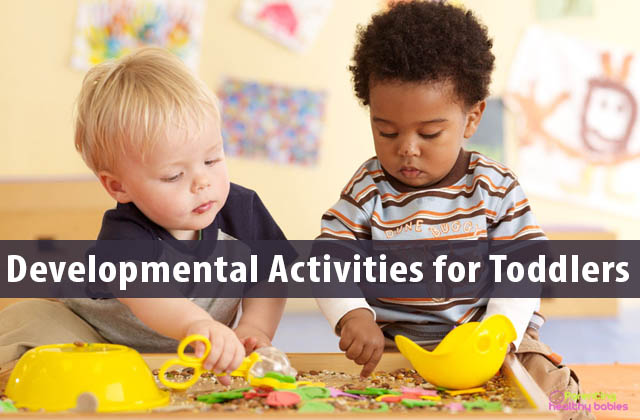Babies between the ages of 1-2 are very swift learners, as they are constantly interacting with their environment and learning from external stimuli. You have to give them a lot of attention and channel whatever they are learning in the right way to boost their emotional, social, mental and cognitive development. As a parent, there is a lot you can do to help with it, as your child spends the most time with you.
Toddler Activities: 39 Best Developmental Activities
Sing-a-Longs
Your child is developing his or her language skills at this particular point of time. Arranging sing-a-longs for him/her with important words, or playing his/her favourite songs in the car helps a lot as he/she gradually starts singing along with you. This will boost memory and promote word creation and memorization.
Identify Noises
Make sure your child pays close attention to the noises he/she hears throughout the day. This will make them more sensitive to the different kinds of noises that are produced by different objects, which will promote objects association and identification.
Practice the Alphabet
The famous “Alphabet Song” is a great way to promote your child’s memory and build early vocabulary skills. Sing the song to him/her until he/she starts singing along, and then let him/her sing it alone. Gradually, they will remember the entire song and the different alphabets in it, in order.
Practice Counting
It is at this age that children start developing their speaking and thinking skills. Practicing counting will familiarize the number system, which will be very useful to them later. Practice by encouraging your child to count the number of clothes in his/her closet, or the number of shoes he/she owns. Counting daily objects means they will never run out of things to count, and will soon make a game out of it.
Practice Shape and colour
Describe things around your child on the basis of their shape and colour. For example, “this is a red apple”, or “you have a big, blue ball.”. Gradually, they will identify things themselves and describe them to you.
Give them choices
Giving your child choices helps to instill a sense of confidence in them from a really early age, and they learn to make their own choices and be confident in them later in life. Give your child simple choices, like “Do want an apple or a pear?”
Ask Questions
Asking questions to your child such as “What should we do after this?”, “Who do you think ate the cookies?”, helps your child to think for himself/herself, and makes him/her curious about his/her surroundings. This makes your child think and reflect on hoe everything works.
Take them to interesting places
Apart from parks, take your child to museums, planetariums, etc., so that they can start associating these experiences with something new and exciting from an early age.
Create new games from daily items
Playing with daily items promotes a lot of creativity in your child, and in you as well. For example, ask him/her to match the correct lids to the correct containers, or count how many utensils are there in the kitchen, or how many bottles of water there are around the house. These things will promote a lot of skills in your child and keep him/her occupied in a constructive manner.
Offer many games
Children get bored easily, so you have to keep them occupied with new games every day. Games like Hide-n-seek, Peek-a-boo, Simon Says are entertaining as well as a good way to develop mental abilities in developing toddlers.
Play with numbers
Using everyday items, teach your child to measure how tall someone or something is. For example, “The jar is three apples tall”, or “My kitten is ten legos tall.” This will help them learn the concept of numbers and measurement, from a really early age.
Label items around the house
Pick a few small (chocolate and muffin jars, milk bottles, etc) and a few big (sofas, refrigerator) items and label them. Change their positions around the house once very few months and let your child identify the changes.
Make Organisation Fun
Add labels to stationery bins, laundry baskets, cloth hampers, etc, and make a game out of it. Give your child a piece of fruit or favourite candy every time he/she puts things back in the right place. This will condition your child to be organised from early on.
Arrange a Scavenger Hunt
Children love exploring, and Scavenger Hunts are a great way to fuel this trait. Hide your child’s toy around the house and encourage him/her to locate every toy. You can add further step by gather three or four objects and asking questions like, “Which one of these is blue?”, “Which is the biggest among these?”
Take Your Child Out
Take your child around the town and make him take notice of the surroundings- the fire station, the post office, the mall, and encourage him to interact with people on the road as well, with at least a polite “hello” and a “goodbye”.
Pin pictures
Keep pictures of friends and family on a soft board on your child’s wall to improve your child’s memory and association skills. These pictures should be mostly of family members who live away, such as grandma or aunt, and you can add words under those pictures, such as “Aunt Mira”. This will boost your child’s memory and help her remember better.
Create sounds
While children at such a young age cannot tell you which note is which, they can tell the difference between different sounds. Try to play different instruments around them, and clink an empty glass with a spoon, or show them how the pressure cooker gives a high whistle when lets out steam. This will instill a sense of musicality in your child.
Early mathematics
Instruct your child to perform simple tasks like, “set four plates on the table”, “add two spoons for each plate”, “If your father and brother don’t eat with us tomorrow, how many plates would we need”/
Recognising colours
When you’re taking your child out, set him a colour to show you, such as, “Show me all red objects”, “tell me when the light turns green”, this will help your child get better at identifying colours.
Letters
As you pass different signs and hoardings and billboards, ask your child to point out the different alphabets she sees, in alphabetical order.
Shapes
Children love pointing out shapes and sizes, so assign them tasks like “Find me ten round objects”, or gather four or five different objects and ask them, “Which object among these is a square?”
Increase Vocabulary
Simple activities such as differentiating the texture of butter from the texture of crystal sugar and calling them “smooth” and “coarse” respectively helps your child build a good vocabulary and describe things better.
Money
Kids this age cannot tell the difference between note denominations, but they are old enough to realize that buying things form someone costs money. You can help them understand this concept better by teaching them about needs and wants, for instance, “Are cake pops something we absolutely need or are they something we can eat as a treat?”
Social Skills
When you are standing in a queue or waiting in a line, ask your child to look at people’s faces and tell you what she thinks they feel. “Is that man over there happy?”, “Do you think she is angry?”
Shapes and colours
While engaging in activities like gardening, ask your child to point out the shape, size, and colour of the same object. For example, “The seed is small, round and brown in colour.”
Size
Pick out different types of objects and ask your child to arrange them from biggest to smallest. You can also ask him to weight the objects to see if the biggest is also the heaviest or not.
Memory Boosting games
Use memory boosting games in your daily play, such as “I Spy”, “Simon Says” or even simpler games like hiding two or three of his toys and asking if he can tell which toys are missing.
Make time
Your child requires play time, but most importantly guided play time. Make time for your child and indulge in different kinds of games and activities with him. Research shows that while playing, the body produces a lot of bio-chemicals that are essential for growth and development.
Discuss
Try to discuss past events with your child. For instance, “Who did you see yesterday at the park?”, “What did we have for lunch yesterday?” This not only helps your child’s memory, it also helps him know the importance of paying attention to detail.
Sing to your child
If your child is having problems grasping words, sing to him. Children pick up songs much earlier than they pick up on words and sentences. Teaching your child to talk via the use of songs is actually a good way to teach him because music, according to research, is a certified pre language learning tool.
Give them opportunities to be helpful
Toddlers want to be as helpful as they can while you’re running errands. This gives them a sense of achievement and independence, which helps their personality grow. The next time you go grocery shopping, give your child a small list of things to buy, to remember.
Sleep
Sleeping is very important for your child, because he/she remains very active throughout the day, and needs ample rest. Getting proper rest helps with brain development and your child learns concepts and language faster when he/she has had enough rest.
Point Out Differences
When you go shopping or to the supermarket, show your child two different sized boxes of the same crackers. Show them how these two things contain the same thing but are different with respect to size. This will teach them to observe differences.
Make Learning Fun
Learning, when done in a free and happy environment free of pressures, it is better absorbed by children. This is especially true in the case of toddlers, who want everything to be fun and tend to retain knowledge better when they’re doing something they enjoy.
Stop Comparing
When your child interacts with other kids her age, there is a good chance that there will be developmental disparities among them. Some might be more developed, and some might be less, but it is important to not compare these differences. Children will slowly and surely get to the point of development, and you shouldn’t try to hasten it.
Set Examples
If you want your child to be open and friendly with strangers, you have to set her an example. Children imitate adults, and besides, if she sees you are comfortable with someone, she will learn to be comfortable with them as well. On playdates, you can make friendly conversation with the other children, such as, “Hey what is your teddy bear called?” This will encourage your child to join the conversation and it will be easier for her to make friends.
Planning
Planning is important when you are exposing your child to different experiences. Take him out to shops and to meet other kids his age, but plan in advance about how you want these experiences to go, and work accordingly.
Stick with small groups
Children tend to get intimidated when surrounded by unknown crowds and they end up feeling overwhelmed and shy. Don’t push you child too much out of his comfort zone; stick to small groups of familiar friends where they can freely work and play.
Strike a balance
Don’t push your child too much out of his comfort zone; if he is withdrawn, chances are he will start to warm up once he gets accustomed to the surroundings. Don’t push him too much, just enough to encourage him. At the same time, don’t overprotect him. He needs to go out and learn things for himself. There should be a proper balance.
References:
https://www.parents.com/













